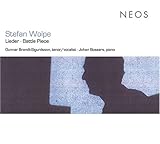WHO’S AFRAID OF THE BIG BAD WOLPE? Surely not Eric Huebner!
This is what we know about Stefan Wolpe (Born in Berlin to Jewish parents, 1902– died in New York, 1972) a member of the Bauhaus, he befriended the Dadaist Kurt Schwitters; emigrated to Palestine, 1933; to New York, 1938, supported himself by teaching harmony to jazz musicians; as head of experimental Black Mountain College, in the 1950s, he rubbed shoulders with musical polemicists Morton Feldman, John Cage and David Tudor. His First Symphony, commissioned for Bernstein’s ill-advised “avant-garde festival” with the NY Philharmonic in 1963, was curtailed at its premiere because of “extreme difficulty”; his knock-‘em-in-the-aisles 
 Battle Piece (“Encouragements for Piano,” ‘Battles, Hopes, Difficulties, New Battles, New Hopes, No Difficulties’) was dedicated to Tudor. Beyond all this, he was one of the 20th Century’s most potent, unquenchably inventive creative personalities.
Battle Piece (“Encouragements for Piano,” ‘Battles, Hopes, Difficulties, New Battles, New Hopes, No Difficulties’) was dedicated to Tudor. Beyond all this, he was one of the 20th Century’s most potent, unquenchably inventive creative personalities.
That work, the Wolpe Battle Piece, formed one bright spot of a major and stirring weekend musical event up at Villa Aurora, the haven in the Palisades for exiled German artists, currently maintained by that country’s Consulate General. The program’s other major work, no less complex and demanding, was the last of Victor Ulllmann’s seven Piano Sonatas, a hugely affirmative outburst built around variations on a short Schoenberg piano piece. Best known for the satirical short opera Der Kaiser von Atlantis (performed in Long Beach last month) composed during his imprisonment at the Teresienstadt camp, Ullmann included in his Sonata the inscription “The right of performance remains with the composer.” Shortly after completing the work, Ullmann was transported to Auschwitz and its gas ovens.
The concert at Villa Aurora was an important event, a gathering of music created as mortal fears darkened Germany’s skies, valuable and interesting programming by the Villa’s newly appointed Program Director, Daniel Rothman. I have never been a strong upholder of Ullmann’s Kaiser , which I hear as excessively contrived Carl Orff, but this Seventh Sonata is something else again, a masterpiece etched in blood. Eric Huebner’s performance – remember his amazing work in Messiaen’s From the Canyons a few months back? – swept through that historic room with its magical seaside vista. As dessert there was also friendlier music: Schoenberg’s Fantasy for Violin and Piano, eloquently delivered, Eric’s astonishing piano command and more of the same from Mark Menzies’ exuberant violin.
SEASONAL ENDINGS: I’m not quite sure, the significance of guest conductor Christoph Eschenbach’s once-again choice of the Bruckner Seventh Symphony, as the Philharmonic’s seasonal closer-downer, but he did so, once again, as in recent years, and drew some noble noise from our orchestra’s brass contingent. Even better was that concert’s opening work, one of Mozart’s most congenial “middle” symphonies – No. 34, in C: a joyous essence, music that simply trips over itself in a paroxysm of giggling trills and triplets. More, please!
TRIVIATA: La Traviata was my first-ever full-scale operatic experience: 1941, with Licia Albanese and Jan Peerce, myself enthralled in standing room, with the Met on tour, in a Boston movie palace. Memory is a fragile substance; being no ardent admirer of Mrs. Domingo’s flannelly dramaturgy, I had determined to sit out the L.A. Opera’s current revival of Verdi’s verdant weeper — until the news began to circulate that, clunky production and all, the Traviata this time around was the one not to miss. That news was, as they say, spot-on.
Marina Poplavskaya had sung her first-ever Violetta in Amsterdam only last month, and sang it here once more. She is a dreamer’s Violetta. Russian by birth, dark and strong of feature (if blonde in her program-book photo). She commands the role, and the stage, with a voice deep and rich, intense and flawless. She does not mess with her music; there was no show-off, interjected E-flat in her “Sempre libera” to woo the gallery; the heartbreak in her scene with the elder Germont arose from Verdi’s music alone, not from any painted-on theatricals. Grant Gershon was the conductor, a company debut long overdue, a master of the essence of sung opera. From their first music together there was an eloquence, an elegance, an exactitude of accent that you dream about – but seldom get to hear — in this music. that raises and maintains the emotional temperature and makes you aware of that rare and wonderful emotional richness that defines Verdi’s greatness when the accents are sure and loving. As the Germonts father and son neither Andrzei Dobber nor Massimo Giordano sang their music as the roles deserved. The Alfredo was brave, but not well advised, to attempt the killer cabaletta (”O mio rimorso”) that wiser spirits usually omit. This was a Traviata about an authentic heroine, and about her power to define for an audience an authentic human tragedy.
SO FAR — I turn 85 next week — SO GOOD.


